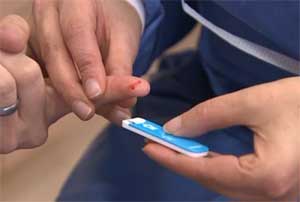- Home
- Editorial
- News
- Practice Guidelines
- Anesthesiology Guidelines
- Cancer Guidelines
- Cardiac Sciences Guidelines
- Critical Care Guidelines
- Dentistry Guidelines
- Dermatology Guidelines
- Diabetes and Endo Guidelines
- Diagnostics Guidelines
- ENT Guidelines
- Featured Practice Guidelines
- Gastroenterology Guidelines
- Geriatrics Guidelines
- Medicine Guidelines
- Nephrology Guidelines
- Neurosciences Guidelines
- Obs and Gynae Guidelines
- Ophthalmology Guidelines
- Orthopaedics Guidelines
- Paediatrics Guidelines
- Psychiatry Guidelines
- Pulmonology Guidelines
- Radiology Guidelines
- Surgery Guidelines
- Urology Guidelines
A new pocket-size device to diagnose heart attacks

It is an established fact that Cardiovascular diseases are the No. 1 cause of mortality globally.According to US Centers for Disease Control and Prevention, about 47% of sudden cardiac deaths occur away from hospital after Development of first signs of heart attacks as many people with heart disease do not act on early warning signs.
Even when patient reaches hospital testing for diagnosing MI takes lot of time as existing blood tests can take up to six hours to deliver a result, after a patient shows symptoms of a heart attack. In order to diagnose MI quickly a new One Step cardiac FABP Test Device has been developed by Israel Scientists which could make detection of MI simpler, quicker and cheap.The new five-minute test is more accurate and convenient.
The Novamed SensAheart One Step cardiac FABP Test Device is a lateral flow-based immunoassay designed for the detection of FABP3 in miniature-sized (a single blood drop) human whole blood, plasma and serum samples. The human cardiac FABP (hFABP or FABP3) is a 132 amino acid small molecular weight (15kDa) protein. FABP3 is one of the most abundant proteins in cardiomyocytes and is mainly involved in fatty acid transport. The concentration of fatty acids in plasma and in myocardial tissue rise during myocardial ischemia acting to protect myocytes against fatty acid oxidation. Upon acute myocardial infarction (AMI) the blood and urine levels of hFABP rise rapidly (within 1-3 hours) reaching their peak values at 6 hours, and return to baseline concentration within 24 hours. Characteristics of hFABP appear to be similar to those of myoglobin, however, hFABP concentrations are 2-10-fold higher in the heart than in the skeletal muscle. In contrast, myoglobin concentrations are 2-fold lower in cardiac cells than skeletal cells. Thus, the apparent greater cardiospecificity hFABP, along with certain aspects of its biology account for its greater value in diagnostics of AMI.

Disclaimer: This site is primarily intended for healthcare professionals. Any content/information on this website does not replace the advice of medical and/or health professionals and should not be construed as medical/diagnostic advice/endorsement or prescription. Use of this site is subject to our terms of use, privacy policy, advertisement policy. © 2020 Minerva Medical Treatment Pvt Ltd